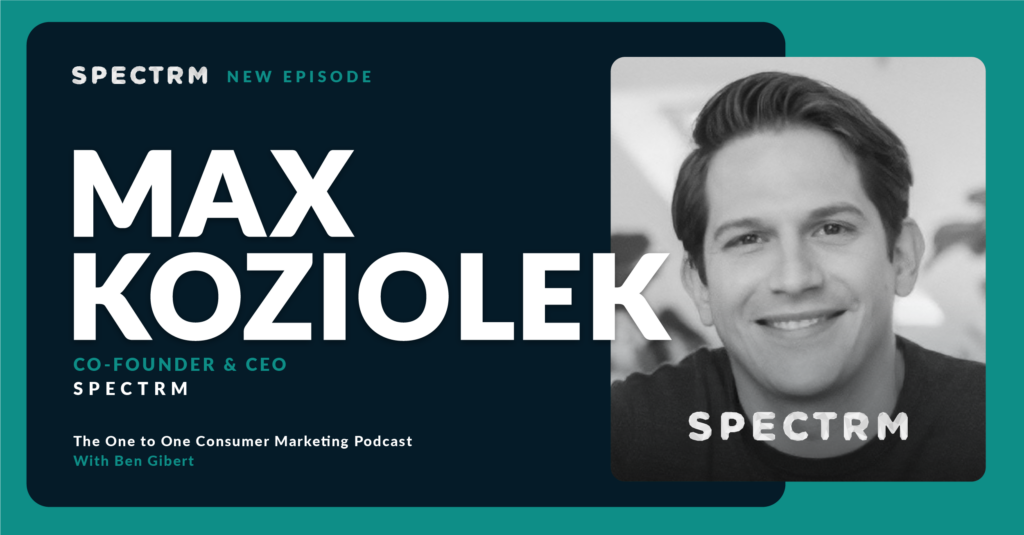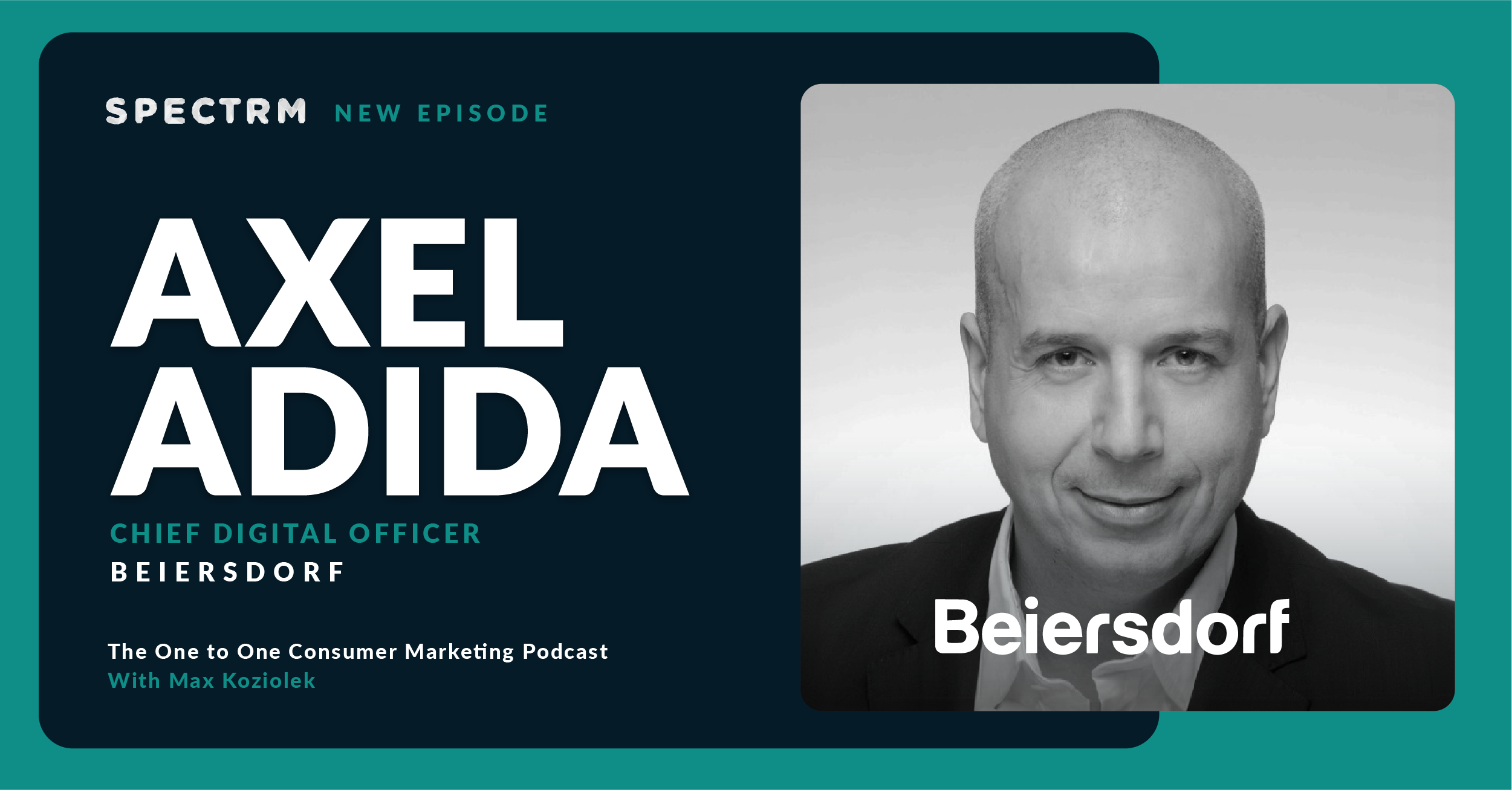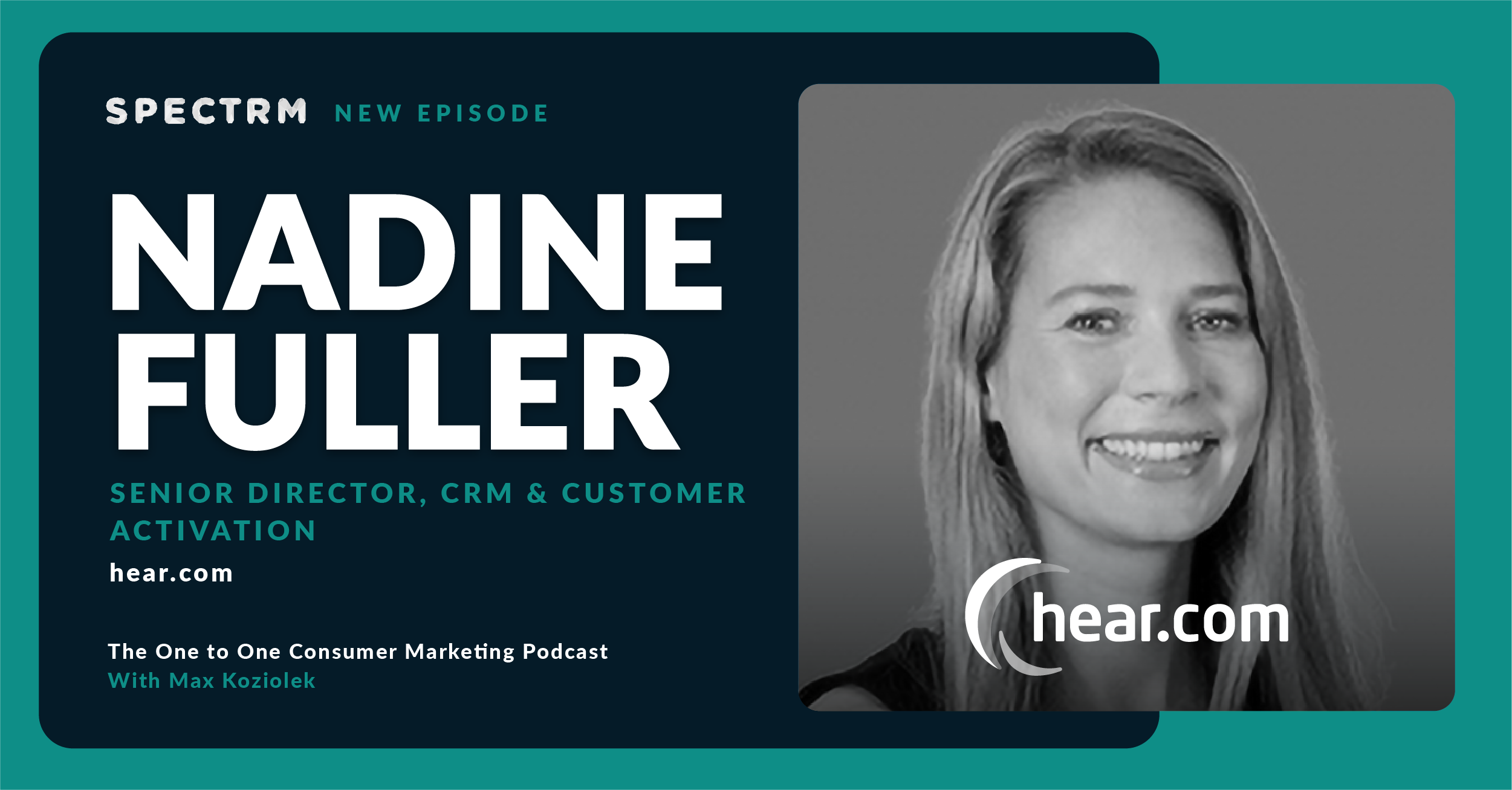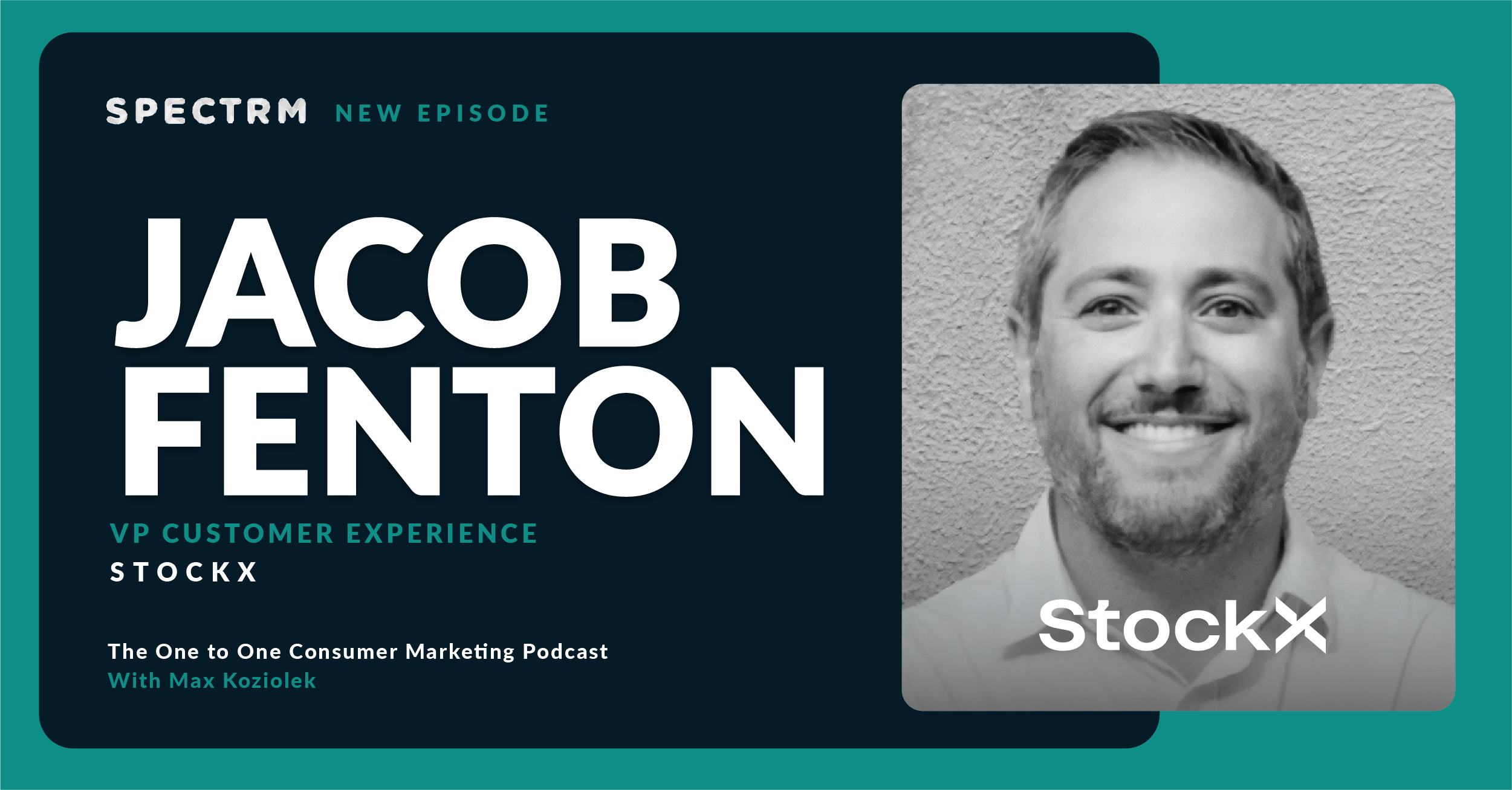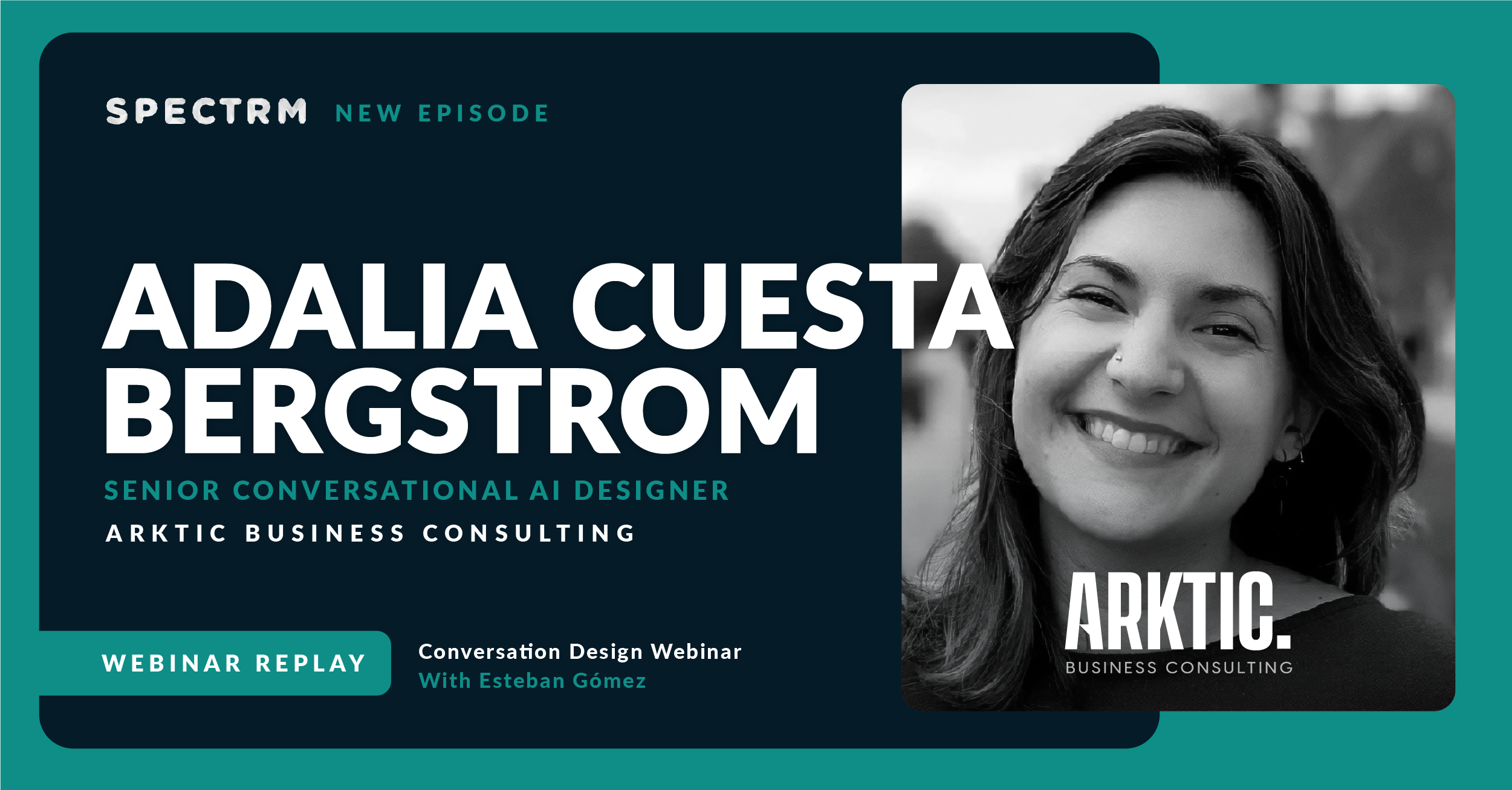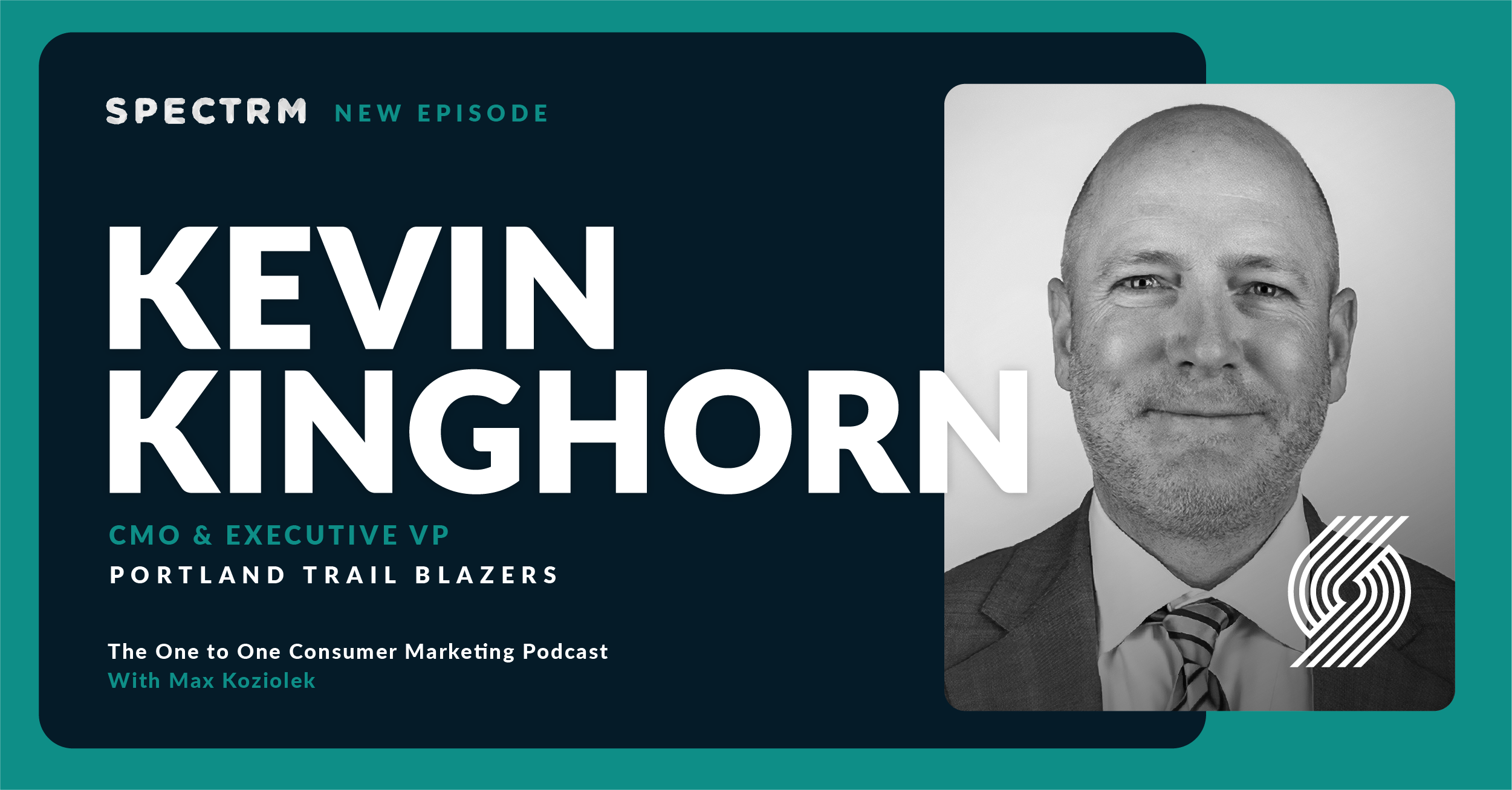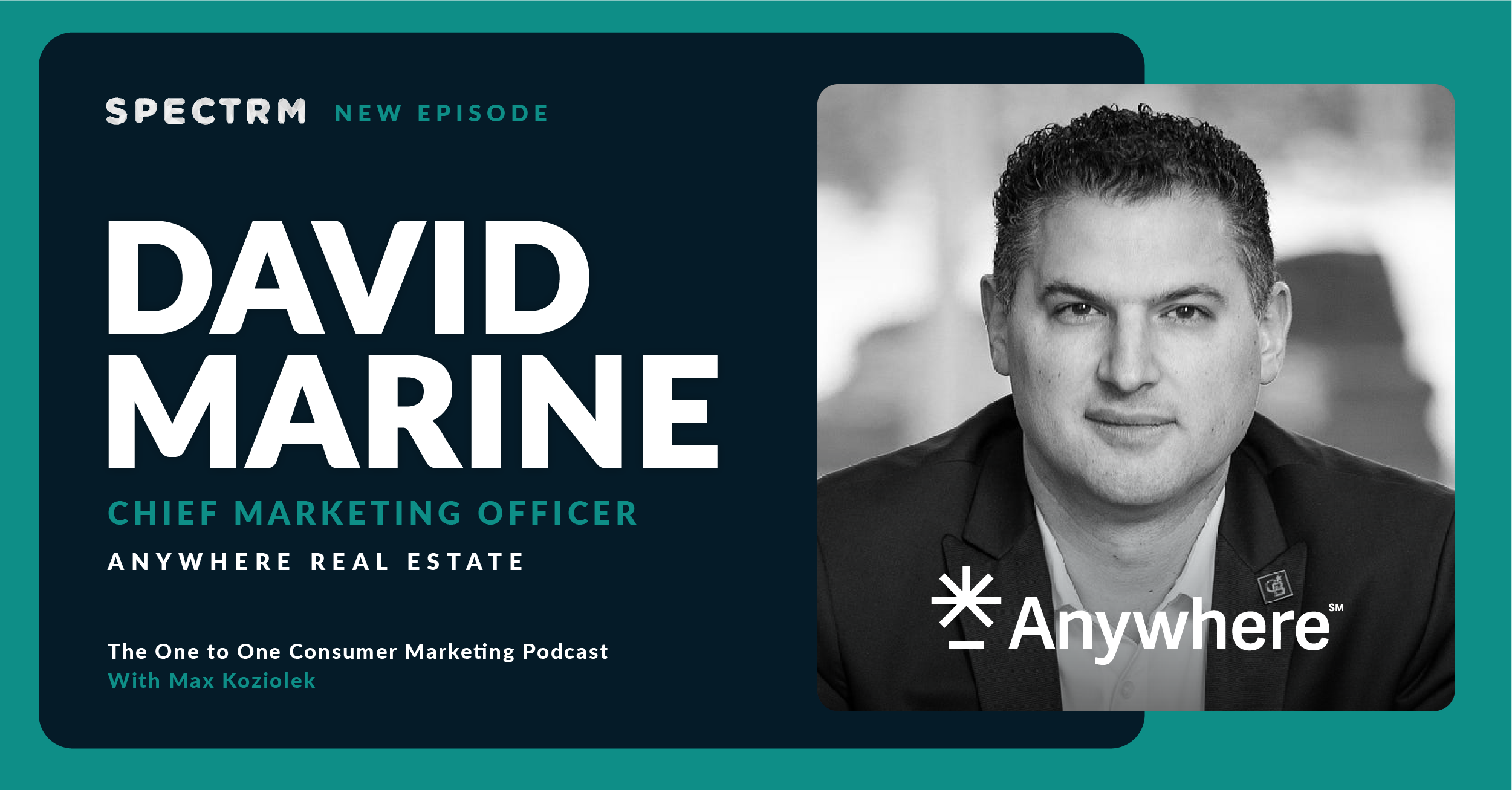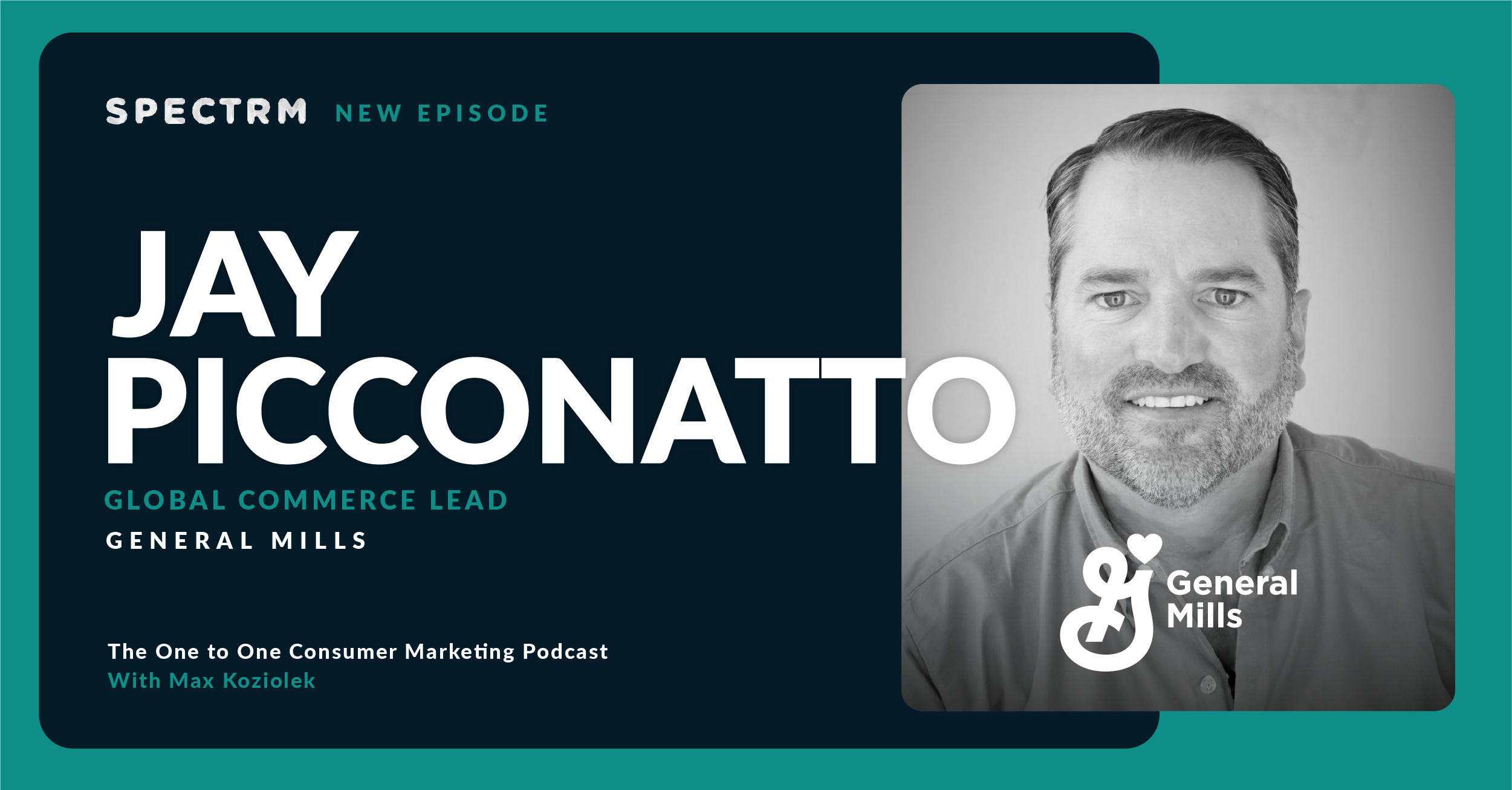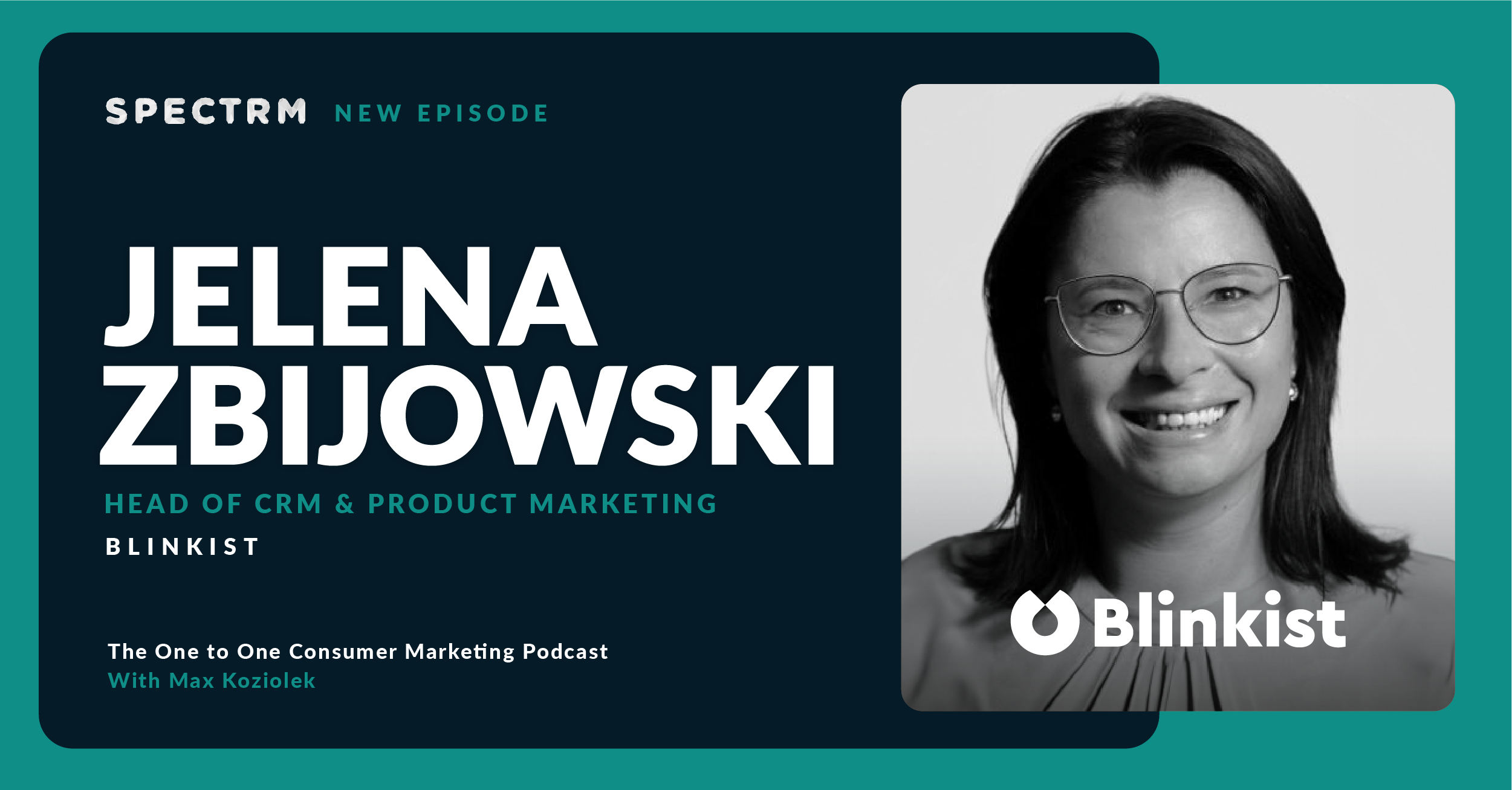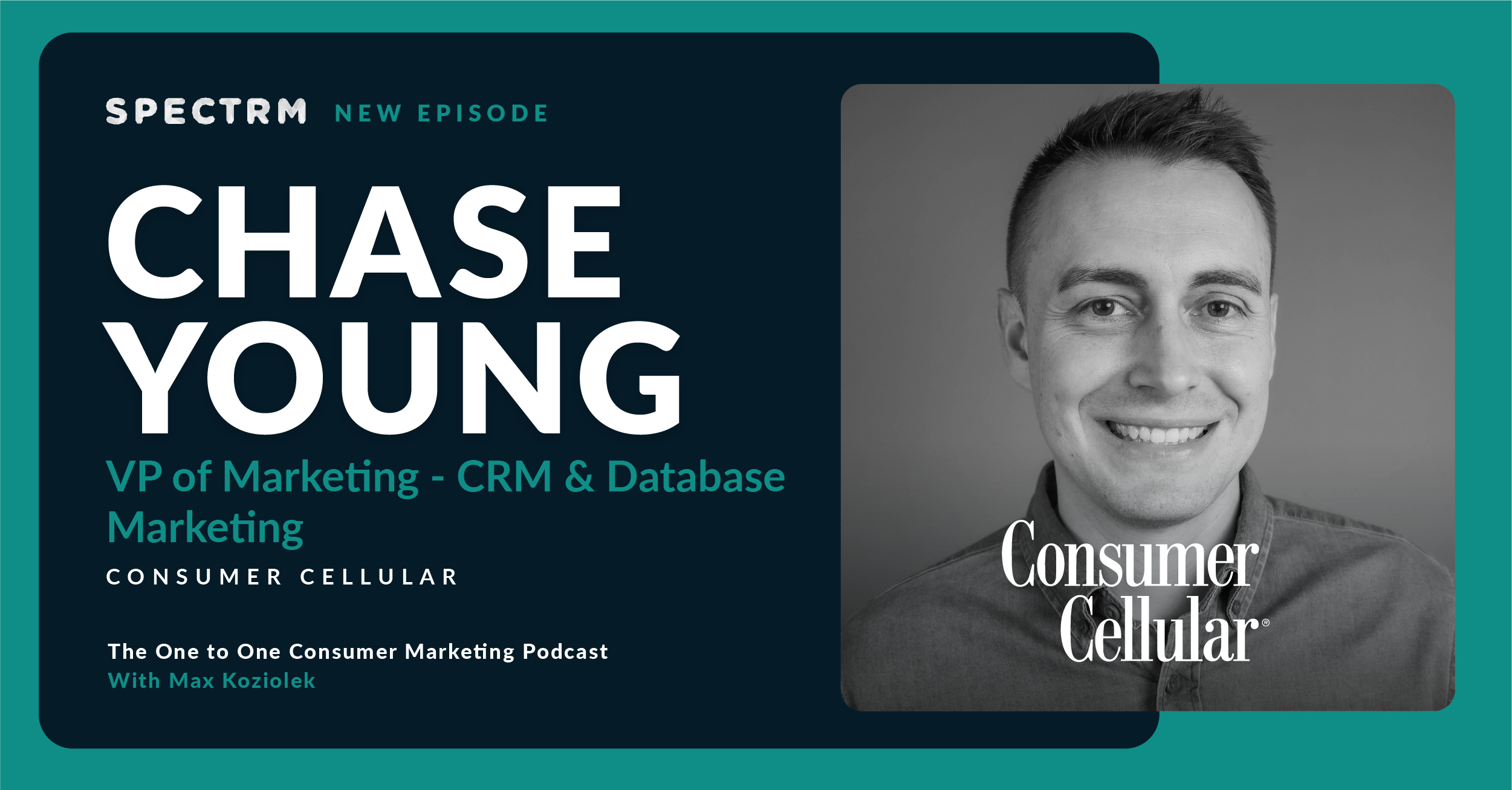Summary
In this special episode, Ben speaks with Max Koziolek, Co-founder and CEO of Spectrm, who will be taking over hosting duties as Ben departs. They discuss how far the podcast has come and where it’s going, and how it’s created a space to spotlight retention marketers and the work they do. They also talk about lessons learned from the guests, how messaging is the way in which we build relationships today, and what the future of retention marketing will be with the integration of AI and LMMs.
Topics discussed
- How far the One to One Consumer Marketing podcast has come over the past 40 episodes, and where the podcast is headed into the future.
- Why Spectrm created a podcast and how it provided an opportunity to put retention marketers in the spotlight.
- Lessons learned from the various podcast guests around orchestration, customer journeys, and career development.
- The importance of retention marketing, and how podcast guests are using orchestration, data collection, and experimentation to build relationships with customers.
- Why messaging is the modern channel through which to build relationships with brands and with each other.
- The vision for the future of brand messaging, and how it will grow with the integration of AI and LLMs.
Speaking to retention marketers and inviting other retention marketers to join, that's not really something that a lot of other people are doing. There's not a big, so far, not a big stage for that. So doing that on a podcast and bringing really leading retention marketers on the show to talk about what they do all day, how they do it, and what are the obstacles, what is working, what is not working. That was a really compelling concept and it's really exciting how that has grown over the last almost 40 episodes. It's amazing.
Guest biography
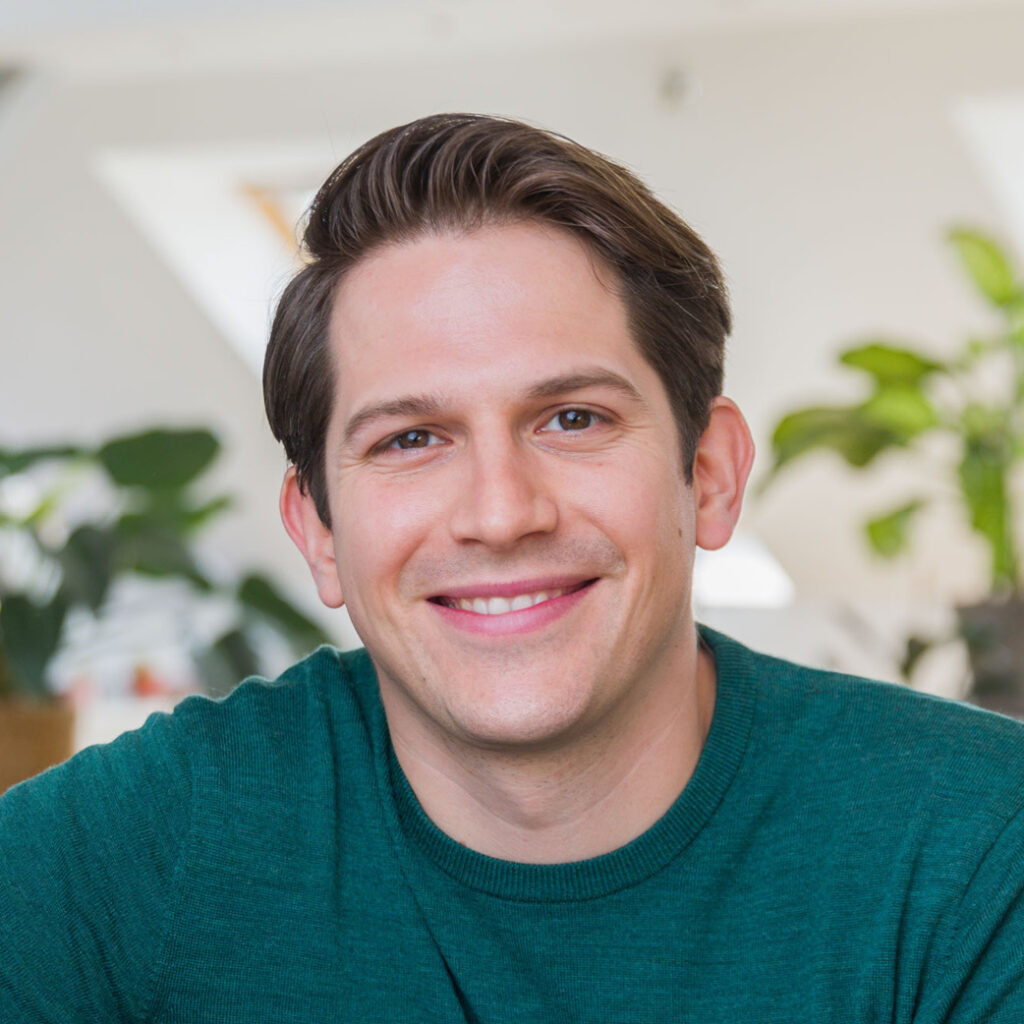
Company overview
Make messaging your #1 CRM channel to build lifelong customer relationships. Spectrm is the conversational marketing platform that powers many of the world’s leading chatbots. From disruptors to Fortune 100 companies, teams rely on Spectrm’s platform, conversational AI and customer success to design experiences their customers.
Industry: software | www.spectrm.io
Subscribe to the podcast newsletter
Transcript
00:00
Max Koziolek
Speaking to retention marketers and inviting other retention marketers to join, that’s not really something that a lot of other people are doing there’s so far, not a big stage for that. So doing that on a podcast and bringing leading retention marketers on the show to talk about what they do all day, how they do it and what are the obstacles, what is working, what is not working. That was a really compelling concept and it’s really exciting. That has grown over the last almost 40 episodes. That’s amazing.
00:33
Ben Gibert
You. Hey, everyone, and thanks for listening to and watching the one to one consumer marketing podcast. Today is a very special episode because I’m actually going to be interviewing Max Koziolek, who is the CEO at Spectrm and has been my boss for the last five years. This is going to be a very fun and special one for us. Max, thanks so much for coming on the show.
01:00
Max Koziolek
It’s a pleasure to be here. Both really excited.
01:03
Ben Gibert
Yeah, I mean, for context for all of our listeners, as You’ve been listening to my voice for who knows, the last 40 episodes, maybe. I made the tough decision recently to move on from Spectrm. It’s been nearly five years, which, as we all know, for people who work at startups, feels like about 25 years with how much goes on at a startup as fast paced as Spectrm. But I’m very excited that Max is here today. He is going to be taking on the podcast. He’s going to continue interviewing marketing leaders at global consumer brands. And Max, you know, has been an amazing boss these last five years. I’m sure he will be an amazing podcast host, as you know, to start things off, Max, I’d love to hear why you even let me start a podcast in the first place, because it’s.
01:50
Max Koziolek
Been quite a definitely and for sure that was an experiment at the beginning and exciting idea when you brought that to me. I think what was really convincing around the podcast idea was that the people we are making the podcast for are usually very much in the spotlight, unlike to the grooming folks in marketing, which are going to con and enjoying their frozen margaritas on the yachts. Right. So speaking to retention marketers and inviting other retention marketers to join, that’s not really something that a lot of other people are doing there’s so far, not a big stage for that. So doing that on a podcast and bringing leading retention marketers on the show to talk about what they do all day, how they do it and what are the obstacles, what is working, what is not working. That was a really compelling concept and it’s really exciting how that has grown over the last almost 40 episodes.
02:48
Max Koziolek
That’s amazing.
02:49
Ben Gibert
Yeah. And I’ve always been amazed too at the you always mentioned the podcast in our meetings behind the scenes. You always listen to every episode and I think that speaks a lot for how much you want to kind of learn about retention, learn about CRM directly from the people who are the types of people that are our customers. I think one thing we see on the podcast, too, is a lot of career advice given or like strategic and tactical advice. Have you learned new things from the podcast and from the interviews we’ve done?
03:22
Max Koziolek
Oh, so much. I mean, there are so many different approaches to problems. Right. Let’s talk about orchestration. Right? So there are two camps in orchestration, how you do that and to hear in different episodes people taking different approaches on that. I think that’s very exciting. But also the career aspect, right? To see how people have built their career in the space as a retention marketer in CRM, I think that’s really exciting because no one speaks about that. Right. So how can you learn from that? What makes you successful if you have chosen this career path and what is not so helpful? Right, so I think these are all very exciting aspects and even for us, from a product perspective, we learn so much from how people think about this cascading through user journeys, identification of user or of users. I think that’s all very interesting.
04:14
Max Koziolek
And yeah, people still, every new guest, as you said, I listen to every episode and every new guest brings a new perspective on a few things and a few more little hints of tactical advice, which I think is also something that we need to share more.
04:30
Ben Gibert
Yeah, absolutely. I’ve been amazed myself at how much I enjoy taking the time out of the regular day of startup marketing and speaking to the people that we’re building this product for. And I know that one thing that we’ve spoken a lot together is also community and building that community of CRM marketers through the podcast. And I think that’s something that we have exciting things coming for Spectrm as well. But how are you feeling about the community of CRM marketers and retention marketers that we’ve built over the last year and a half with the podcast?
05:04
Max Koziolek
This community is amazing because I think for a lot of other fields and in marketing, there are communities where you can tap into, especially on the retention marketer and CRM side, there are very little. So the people have been super kind, super helpful. If you ask them, they’ve just been on the podcast, you ask them to come on another episode to chat with others, absolutely no problem. You ask them to give feedback on something, they respond in a day. So I think that’s really exciting because I can only foresee how this is growing. Right. So the more people we bring on, the more different perspectives we have, the more similar companies or similar profiles, similar challenges we have. And that is a little bit of like a flywheel, right? So more people we have, the more value it creates and the more people hopefully will join.
05:56
Max Koziolek
And I think our goal down the line is to really build the community for retention marketers at global companies, because there are quite a few, but it’s very hard to connect the dots for them and to build that.
06:10
Ben Gibert
Yeah, I mean, it’s exciting stuff and I’ll very much be looking on with excitement. I will try to get into the community as well. I will be there. But I think one thing for us that was so interesting over the last, when we started the podcast, were really interviewing kind of all marketing leaders at global brands. But then when things shifted in the economy and we started really focusing on retention, I think businesses were shifting a lot of resources away from growth at all costs and into making more money from their existing customers. So I think that focus on CRM at the kind of business strategy level is something that we also did very much at the podcast level. And I think we saw some very interesting shifts for us, at least in terms of the learnings and the type of interest from people that you mentioned.
06:56
Ben Gibert
Like, the community has been incredible and much more active than before because really, CRM is at the heart of all things retention for consumer brands. And so getting very close to them and learning why they’re doing what they’re doing and all of that work has been an amazing learning journey for, I think, all of us.
07:13
Max Koziolek
But what are your insights on that? I mean, you interviewed now, really from global brands which are making a ton of revenue and engaging millions of consumers every day. So we have seen a shift in the economy and retention became more important than before. So was that the sentiment of the guests? And what else have you seen when you were talking to them?
07:39
Ben Gibert
Yeah, I mean, I think the guests are obviously biased being CRM marketers and retention marketers, but that was definitely my feeling from them. Right. They all echoed that idea that much more board and CEO level attention was being paid to their efforts in CRM and retention and that it was really kind of a strategic focus. And I mean, I’ve learned so many things, I think, from all of the interviews. It’s very hard to break it down, but there are probably three things that really stick out to me. One is the whole orchestration piece. I think that’s something that everyone I interviewed with on the CRM side speaks about orchestration in one way or another. Right. How do we connect the dots of the customer journey? How do we engage customers? How do we build the ideal journey? How do we deal for the non ideal journey?
08:25
Ben Gibert
And then how do we kind of really connect with individuals? I think Karan Gupta from Marley Spoon, who’s their global head of CRM, had something that really stuck to mind that I think sums up how so many of them think about it, which is this whole idea of three pillars for CRM. So you have unify, right? Like, how do you unify the entire customer journey? How do you know who each person is? How do you resolve for identity in a digital world, which is very fragmented? So I think that’s a whole topic that I could spend 15 podcast episodes on, but that it’s really interesting how different companies are solving for that. That is kind of the foundation for orchestration, right? You can’t do orchestration if you haven’t unified and understood who that person is and how you can reach them and what the data is that underpins that orchestration.
09:12
Ben Gibert
So then there’s the channels. You might use the logic that underpins how you kind of engage with them. And the final pillar is personalization, right? So once you have unified data, once you have a means to orchestrate journeys, then you can talk about how do we engage the individuals in our segments personally? And I found that nearly every marketer I spoke to talked about those buckets, sometimes in different ways, but it really was how they envisioned the whole journey. The other big piece, I think, was data and experimentation. That always comes up in digital marketing, but I think it was really at the core of what CRM marketers are doing right now. And I love this idea from Aaron Bonsang, who is head of own channels at Irobot, and Gazadushi, who is from Whaler. They both mentioned something along the lines of not all data is created equal, or not all data is good data.
10:07
Ben Gibert
And that really stuck with me, because I think as a marketer, you tend to just think, like, all data is good. We’re trying to hoard as much data as possible. We try to hoard as much signals from advertising platforms as possible. But it was very clear that they value data in different ways and that it can create a lot of noise. And so it’s really important to isolate what is actually the valuable data to base segments on, to really understand who your customer is, and then you engage them. So that was a big one for me. That went hand in hand with also being very clear on experimentation, right. Testing control groups. I think I was amazed to see that all CRM marketers really probably more in a more standardized way than other marketing departments are very strict on control groups, always making sure they don’t have certain people that get a message to the point of they have certain global control groups that never receive any marketing communication at all.
11:01
Ben Gibert
And I think that was you really have to buy into the experimentation mindset to do something like that. So I thought that was something that also really stuck with me.
11:09
Max Koziolek
That is something a performance marketer can’t do, right? That’s the first thing they can’t do. And the second thing is I think also a lot of experimentations on your messaging in performance, especially if you look at ads and media, is outsourced to platforms, right? So I put my budget on Meta, for example, and then I let the algorithm do its thing and I optimize a little bit after that. I maybe work a little creative, maybe a little bit on the targeting. But a lot of the experimentation is outsourced to the platforms by now while retention marketers are doing really heavy lifting of doing all the work, all the data work in order to experiment and work with its different cohorts, which I find very exciting and it’s a tough and data intense job.
11:59
Ben Gibert
Yeah, it really is. And that was evident in the way that they talk about it. And to me, which was also, I guess the third thing that really stuck out from all the interviews was this focus on relationships, right? Like these are the people that essentially own the customer relationship for a brand. And so it was amazing to see that they don’t have this transactional view of marketing that I think performance marketers might have or acquisition marketers might have. They really have this relationship marketing view. So to know certain things that stuck out, like David Hickson from Ally Financial had the term conversation choreography, which I loved, which was really his idea of you’re trying to choreograph conversations with millions of customers at the same time and engage them personally so that it’s relevant to them. So that you build a relationship because relationships are built on trust.
12:48
Ben Gibert
So the job of a good retention marketer is really to be able to choreograph all of those conversations. And so I thought that was a wonderful term for what’s actually going on. And another thing that stuck with me was Georgia Price from Press. Once know, treat customers like you want to be treated, right? The kind of thing you tell your kids, like treat other people how you want to be treated. But amazing, the simplest thing that I think so many brands can get wrong as well is like understanding your customer for the fact that you are building a long term relationship with them. And if you want to build a relationship, you can’t take actions that make that conversation less valuable that might jeopardize that relationship. So that really is one that stuck. And another thing is also just so many CRM marketers are technical, marketers are very deep in this database of their customers and they’re so deep in the technology.
13:38
Ben Gibert
But one thing that I had many of them mention was also when I asked them about career advice like what are tips you would give other marketers? So many of them mentioned building relationships with other teams. So not just building relationships with your customers, but recognizing that you don’t operate in a vacuum, especially at a global consumer brand. There are other localized teams, there are other completely different departments that will touch what you’re doing in CRM because you’re at the heart of everything. So learning how to manage relationships across those teams is also something you should be focusing on. Yeah.
14:10
Max Koziolek
And you can also only do so much if I don’t know, the onboarding sucks. Right? So if people are not getting the value out of the product, it’s very hard to get them to second purchase or to remain subscriber.
14:22
Ben Gibert
Right.
14:22
Max Koziolek
So if you I don’t know, if you’re a retention marketer at Netflix and you don’t bring out new shows, might be tricky to retain the customers, no matter what kind of user journeys you build. So you have to work with the others, right?
14:35
Ben Gibert
Yeah. And I think that relationship side of it so crucial to brands who want to build loyalty, who want to increase their average order value, increase their lifetime value, all of the metrics that CRM marketers retention, marketers care about, it’s a conversation. We’ve had so much, right? Like, the two of us have talked about relationship marketing, what relationships mean to brands so much, especially in the context of messaging. Right. Because I think for us, obviously, we are in the messaging space. You’ve built a company focused on messaging. It’s a company that I’ve heard you in so many different meetings, talk about relationships. What, for you, is that connection? Why relationships and why messaging to build them?
15:17
Max Koziolek
I think relationships are built on messaging. I mean, that’s true if you on Tinder Swipe, right? And then the chat starts, right? So that’s where relationships are built. But it’s also true at work, right? So it’s on Over Slack, which is a conversational interface. It’s a chat. Right? But it’s also true on WhatsApp it’s also true on Instagram DM. So that’s everywhere I think that’s true that modern relationships, human to human, but also human to business, are built on these messaging channels. That’s just how people are wired these days. That’s just how people operate these days. So I think that’s why it’s messaging channels are the natural place for that. And of course, they’re huge scale. I don’t know WhatsApp has almost 2 billion users, a messenger 1.4, and Instagram DMs, where you don’t even know, but I think they’re roughly around 800 million or something like that.
16:10
Max Koziolek
So it’s crazy how big these platforms are. And I don’t know. The head of Instagram at Advanceari tells you. Then they look at the engagement, taking all the text away, just the images, most images, most content is shared in VMs, then Stories, then the feed. Right? So Instagram is not a feed product where you look at the feed, it’s a product which is about VMs. It’s about messaging. And I think that’s why I believe most of the relationships are built via messaging. Of course, the messaging companies, the platforms are so huge that it helps a lot. And I also believe much more in these channels than I don’t know compared to SMS, which is super huge still in the US. Not so much in Europe. But having a conversation on WhatsApp with a business is always conversational, always. It’s never just push only like we see a lot of SMS players still operating.
17:02
Max Koziolek
That’s not the case. It’s always conversational. It’s always a back and forth, and only with a back and forth. You build the relationship, you learn what the other side wants, and then you react to that. And you learn more along the more interactions you have. The more you learn, the more better, the more personalized it gets, because it’s always one to one. So I really believe messaging is the best place and Meta’s platform with their richness are so much better, right? So SMS has four message types, right? So you can send stuff in four different ways. On Meta channels you have over 100, right? So you can send voice messages combined with ourselves, different products, to a gift, to a video, to everything, right. So that’s really exciting, I think. And therefore also the place where relationships are built. And we see so many customers that are so successful with building that whether they are in the gaming app right.
17:54
Max Koziolek
Which is building their community via messaging or it’s an automotive company like VW right. Which allows you to configure your car, which is on mobile impossible if you don’t do it via messaging because you have the options. Do you want to have it in black? Yes, you get it in black. You want to have different seats. There you go. And then you get your full color in the messaging, which is amazing and then you can go to the dealership and do a test ride. So those kind of stuff, I think that’s really exciting. And we will see probably a lot more of these interactive experiences in messaging which build a relationship with the consumer over time and the more consumers get used to that, to build the relationship not only with their peers but also with brands, I think the more important it will come for brands be on these channels.
18:41
Ben Gibert
Yeah, and I think it really echoes so many things that I’ve heard the CRM marketers say on the podcast too, right, which is like in this relationship building game, it’s all about having a conversation. Right. How do you have a conversation with your customers? It’s, I guess, kind of ironic that simultaneously so many are doing it on channels where there is no conversation happening. Right. And I think that’s why I’ve always been bullish on messaging. I think if I think about my own personal life messaging is where all of that happens. Like WhatsApp is so dominant? And it’s funny, I grew up in Europe but I’ve lived in the US for a long time. I’ve watched the shift even of WhatsApp in the US. From an kind of unknown messaging channel to something that now everyone in my friend’s Circle uses just because of the experience, like you say, is so much richer than SMS and even imessage like WhatsApp that messaging experience really is so much better.
19:35
Ben Gibert
But I mentioned I’m bullish in the messaging space. Obviously, I’ve been at Spectrm for a long time. You sold me on the vision for messaging nearly five years ago now. That’s why I joined the company. That I think says a lot about you, but it also says a lot about, I think the space. So much has changed in the last five years. I mean, we’ve seen obviously explosion of new channels, new formats, like so many new brands and use cases that we’ve powered at Spectrm, but also the market, right? The way that people think about chat bots now post chat GPT is wildly different than it was five years ago. And maybe tell the listeners a little bit about what was your vision for the product then and how has that changed and what is your vision for messaging and for Spectrm tonight?
20:23
Max Koziolek
Yeah, I think back then for us, it was always clear that messaging as a channel will be huge, right? And it will be huge for marketing because that’s where people like to communicate. And usually where people like to communicate, marketing follows right at some point. And these channels are better suited than an email, for example, or better working than a push notification. Much better, right. So it’s a completely different game and everybody has it on their phone, nobody will ever turn off the notifications for that, all those kind of things. I think that was very clear from the beginning. And we also, when we got, in the very early days already a little bit of a Google funding to build our conversational AI. So we back then already had the vision of where that should go. But yeah, in the end it turns out it’s a long way.
21:08
Max Koziolek
Right? So it takes time for users to adapt that, it takes time for brands to adapt that, and it also takes time to figure out how do I start, what’s successful, what’s working on the channel, what’s not working on the channel. So I think over the last five years, the vision I think has changed the most since we saw mid last year when we integrated already GPT into our product. How much is changing because of that? I think that’s really all my view on what’s happening in the future. Because if I would give Vvision Now an update here live on the podcast, I think every brand will be on messaging, on a messaging app like they are on social today. And every brand will use a large language model in order to power that because these are two mega trends which are isolated, very hard to ignore.
22:01
Max Koziolek
But combined, it’s very clear that if you don’t do this as the brand and your competitors doing, they eating your lunch. That’s very clear and I think that’s a little bit of a tipping point. We currently see that messaging, with all these richness, all these capabilities, with this push ability to send push notifications, plus this deep and rich understanding of large language models, that’s pretty much the future of a mobile screen at definitely one center stage for mobile for brands in the next coming five years.
22:34
Ben Gibert
Yeah, I think it’s a very exciting time there’s. Like I said, a lot is changing, but the big picture vision, the reasons why this is such a good idea, it really comes down to human nature at the end of the day and how we choose to communicate with phones. So I’m very excited to watch this vision play out. I’ve been excited for the last five years, I remain excited and I will be watching more from the sidelines now. But I’m very excited also that you have decided to continue this podcast because it’s been such a wealth of learning, it’s been an amazing place to build community with so many different marketers at global consumer brands. And why did you decide to continue it? I know I made my pitch, but what convinced you?
23:17
Max Koziolek
I mean, first of all, it will be very hard to fill in because I think you’re doing that in a unique way, which I really enjoyed to listen to. I think I will try my best to step in because I think there’s still so many things which were not able to put on the show. People we have, of course, not only people we have not talked to, but also how many topics we have not covered by now in retention marketing only when it comes to how to advance in career from a junior to a senior level, how what’s the perspective of a CLO on retention marketing only. So I think there’s so many more topics and of course also how is this developing? Right? We are at this point where it’s very clear that messaging isn’t becoming a retention channel and we only have in the last 15 years how many occasions we had where a new channel is coming into your toolbox as a retention marketer.
24:11
Max Koziolek
So how’s that playing out? So I think there’s so many more topics to cover and I know we have a long list of really exciting guests are coming up. So I’m trying my best to step in but very keen to continue that and to do more for the community.
24:27
Ben Gibert
Yeah, well, I’m excited as you’ve been listening to every episode, I know that I will also continue to listen to every episode. I have no doubt you’ll do an amazing job. We’ve had so many conversations about this behind the scenes. We’ve also had so many conversations about so many things in the last few years. I know that you will continue to have great conversations with everyone that comes on the show. So I’m very much looking forward to that to all of our listeners. It’s very bittersweet for me to say goodbye. And Max, you’re in very good hands here with Max. Thank you so much for listening. As always, if there is feedback on this show, please DM me. If you want to learn about how to stay involved in the community that are going to be building at Spectrm, DM me or feel free to connect with Max since he’ll be your new host from now on.
25:17
Ben Gibert
But Max yeah? Thank you. Thank you so much for joining and also for the last few.
25:22
Max Koziolek
Sure, sure. Thank you for launching this amazing and successful podcast. Really excited to continue that and to do my best, but let’s see keen for the next episode.
25:34
Ben Gibert
Yeah, I will be listening as well. So, yeah, to all our listeners, have a great rest of your day and the next episode will resume with regular programming and you can expect a CRM marketer here being interviewed by Max. Max, have a great day.
25:49
Max Koziolek
Thank you very much. Take take care.
